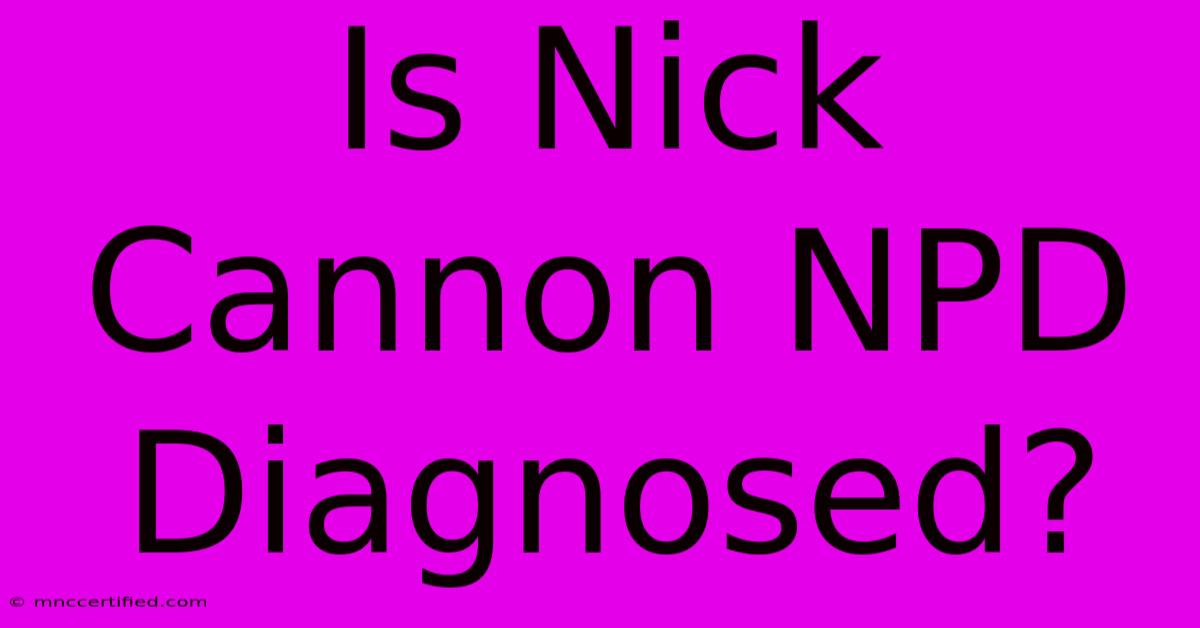Is Nick Cannon NPD Diagnosed?

Table of Contents
Is Nick Cannon NPD Diagnosed? Unpacking the Speculation
The internet is abuzz with speculation about Nick Cannon's personality and whether he might have Narcissistic Personality Disorder (NPD). While it's crucial to remember that diagnosing someone from afar is impossible and unethical, let's examine the common traits associated with NPD and how they relate to Nick Cannon's public persona. This article aims to explore these connections, clarifying that this is purely speculative analysis and not a professional diagnosis.
Understanding Narcissistic Personality Disorder (NPD)
Narcissistic Personality Disorder is a complex personality disorder characterized by a pervasive pattern of grandiosity, need for admiration, and lack of empathy. Individuals with NPD often exhibit:
- Grandiosity: An inflated sense of self-importance, believing they are superior to others.
- Need for Admiration: A constant craving for praise and attention.
- Lack of Empathy: Difficulty understanding or sharing the feelings of others.
- Exploitation: Using others to achieve their own goals, without regard for their feelings.
- Arrogance: A haughty or superior attitude.
- Entitlement: A belief that they deserve special treatment.
- Reactive Depression: Experiencing depression when their idealized self-image is threatened.
Nick Cannon and the Speculation: A Critical Look
Much of the speculation surrounding Nick Cannon and NPD stems from his public behavior and statements. He's known for his numerous children, high-profile relationships, and outspoken nature. Some interpret these aspects as signs of grandiosity and a need for admiration. However, it's vital to avoid jumping to conclusions. These behaviors, while potentially aligning with some NPD traits, could also stem from other factors, such as:
- Public Persona: The need to maintain a certain image in the public eye can lead to behaviors that might be misinterpreted.
- Cultural Influences: Societal pressures and expectations can significantly impact an individual's behavior.
- Personal Experiences: Past trauma or upbringing can influence personality development.
Separating Speculation from Fact: The Importance of Professional Diagnosis
It's crucial to reiterate that only a qualified mental health professional can diagnose NPD. Online speculation, while interesting, lacks the context and in-depth evaluation necessary for a proper diagnosis. Relying on anecdotal observations to label someone with a mental illness is irresponsible and potentially harmful. We should refrain from diagnosing public figures based on limited information.
Responsible Discussion of Mental Health
Discussions about mental health should be approached with sensitivity and respect. While analyzing public figures' behaviors can spark conversations about mental health awareness, it's crucial to do so without perpetuating harmful stereotypes or engaging in armchair diagnosis. Instead, we should focus on:
- Promoting understanding of mental illness: Educating ourselves and others about the symptoms and complexities of disorders like NPD is crucial.
- Reducing stigma: Creating a supportive environment where individuals feel comfortable seeking help without fear of judgment is vital.
- Supporting responsible reporting: Journalists and media outlets should avoid sensationalizing mental health issues and focus on accurate and ethical reporting.
Conclusion:
The question of whether Nick Cannon has NPD remains purely speculative. Without a professional diagnosis, it's irresponsible and inaccurate to label him with this condition. This discussion should serve as a reminder of the importance of responsible discourse on mental health and the need to avoid armchair diagnoses. Let's focus on fostering understanding, reducing stigma, and promoting mental well-being instead.

Thank you for visiting our website wich cover about Is Nick Cannon NPD Diagnosed?. We hope the information provided has been useful to you. Feel free to contact us if you have any questions or need further assistance. See you next time and dont miss to bookmark.
Featured Posts
-
Sephoras Black Friday Fenty And More
Nov 30, 2024
-
Chesneys Secret Les Battersbys Death
Nov 30, 2024
-
Bonding An Above Ground Pool
Nov 30, 2024
-
Haighs Resignation Phone Use Forces Transport Secretary Out
Nov 30, 2024
-
Viewers Agree Colmans The Madness Impact
Nov 30, 2024